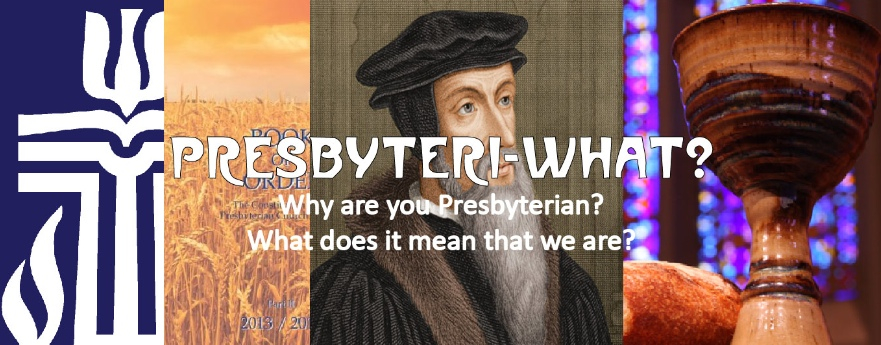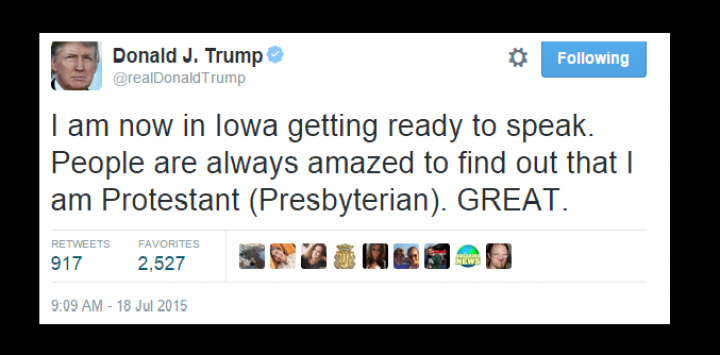When I say the word Presbyterian, in response to the question of what kind of church I pastor, most folks wonder either if it’s that’s some sort a disease, or how you spell it. Greek-informed folks might know that the word comes from the Greek word “presbyteros” which means elder. It reflects the democratic and representational way in which the church is governed and led. A man I run into regularly likes to evoke John Calvin (as the devil) and the false notion of predestination. Maybe that rings some bells for you? And then there are increasingly people who ask what religion that is, if it’s Christian or something else.
It’s not a word often heard – except in the media these days where it’s either referenced as the church that Donald Trump claims as his home (see the tweet below)
or it’s related to some article on church division and opinions either for or against the full inclusion of LGBT folks in the life of the church through equal access to ordination and/or church marriage. Voices either are raised in support, or against such apostasy justifying an exodus from the PCUSA to other church denominations such as the Presbyterian Church of America, the Evangelical Presbyterian Church or ECO.
But none of those completely explain what it means to be a Presbyterian type of follower of Jesus.
In my own life, I left the Presbyterian Church in college looking for a church that was more exciting – used guitars, didn’t really care about the dilemma of styrofoam or non-styrofoam coffee cups, worked more closely with the poor and was more charismatic. I found what I was looking for, but then realized that I wasn’t quite so down with the pastor’s insistence on preaching weekly about how Saddam Hussein was the Anti-christ and our Christian duty was to declare war on Iraq and do all we could do to be good Americans, I mean Christians. There seemed to be not much balance, and an impetus to always agree with the pastor. So I came back home, through continued involvement in the Presbyterian Church through my own home church (which has since left the PCUSA) and work with youth in other churches and in summer camping at Westminster Woods.
What brought me back and kept me in the Presbyterian Family (PCUSA) include:
- an insistence on head and heart, using your brain, life experience and emotions as you read the Bible and apply the teachings of jesus to life today
- a deep inclusion of all people as children of God and welcome to follow Jesus in the life of the church community
- a wide connectional working together of the church across cities, counties, states and the country.
- a balance that I didn’t find elsewhere in terms of the tight rope walk between a central authority (usually the pastor) and the freedom of conscience of each disciple.
- Reformed theology
- an insistence first and foremost upon grace and the sovereignty of God, versus our own sinfulness and the power of the devil.
Many today in the church I serve aren’t sure exactly why they’re Presbyterian besides enjoying our church, past relationships, the context of our church in the city and our historic commitment to both taking the Bible seriously and serving the poor. This six week class I’m beginning is intended to empower others to know what it means to be Presbyterian, why they are, and what that means in terms of the stakes around today’s hot-button issues such as religious pluralism, sexuality and identity, faith-sharing and proselytize, immigration and citizenship, politics and the purity of the Church.
Each week I’ll post a introduction to the class of the week, including some hopefully brief and easy to process readings/media resources which you can use in addition to the regular class material each Sunday.

